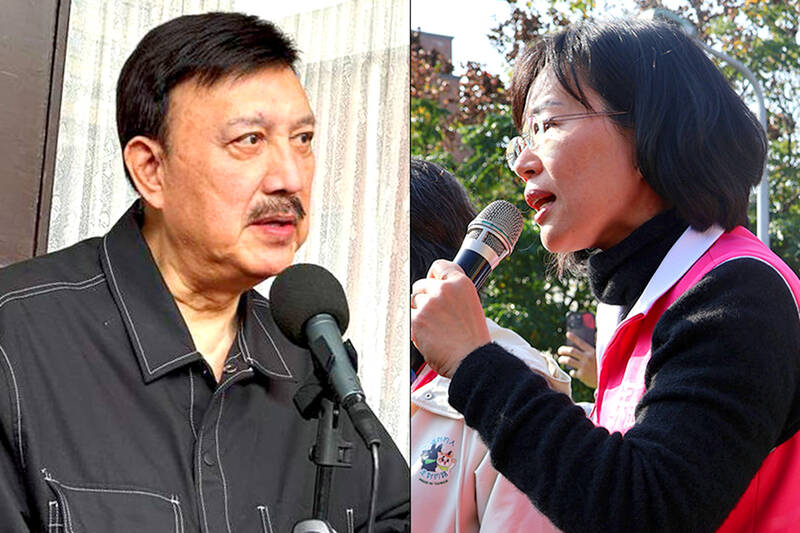The following three paragraphs are just some of what the local Chinese-language press is reporting on breathlessly and following every twist and turn with the eagerness of a soap opera fan. For many English-language readers, it probably comes across as incomprehensibly opaque, so bear with me briefly dear reader:
To the surprise of many, former pop singer and Democratic Progressive Party (DPP) ex-lawmaker Yu Tien (余天) of the Taiwan Normal Country Promotion Association (TNCPA) at the last minute dropped out of the running for committee chair of the DPP’s New Taipei City chapter, paving the way for DPP legislator Su Chiao-hui (蘇巧慧) of her father’s Su faction (named after former premier Su Tseng-chang, 蘇貞昌) to run unopposed with the local backing of New Tide and the Ing faction (named after, but not endorsed by, President Tsai Ing-wen, 蔡英文). This is widely seen as a potential setback for Minister of the Interior and former Keelung mayor Lin You-chang (林右昌) of the TNCPA and his rumored aspirations to run for mayor of New Taipei City in 2026 and a big win for the Su faction.
Across Taiwan 14 of the DPP local party chair races are being contested between factions, often with alliances differing in different localities. Much attention is being focused on Kaohsiung, which has a later registration date, but it is clear that the Chu subfaction of New Tide (named after Control Yuan President Chen Chu, 陳菊) will be running against an Ocean faction candidate now explicitly backed by the TNCPA.

Photo: Liu Hsin-de, Taipei Times
Meanwhile, as the incoming cabinet picks are being released, much attention is focused on the high number of members from New Tide and the “Tainan gang” and that the reported pick of Lin Chia-lung (林佳龍) as foreign minister is a sop to the TNCPA ...
HOW THE FACTIONS VANISHED IN ENGLISH
It is quite likely that none of that made much sense to many readers because the DPP factions are barely — if ever — mentioned in the English-language press. Those that understood the above three paragraphs either follow the local press in Chinese or have followed my past work where every couple of years I have revisited the topic with the latest developments. Those who have lived here since before roughly 2010 may have understood some of this and recognized New Tide and the Su factions, but all the other factions have changed considerably since then.

Photo: Taipei Times file photo
Despite their near-total absence from English-language media, both the DPP factions and the Chinese Nationalist Party’s (KMT) local patronage factions are big topics in the Chinese-language media because they are crucial for understanding how Taiwan’s politics function. We will examine the local patronage factions, which are largely but not exclusively associated with the KMT in a future column, because they function and operate quite differently.
Prior to roughly 2010, the English-language press did cover the DPP factions regularly, but after a quiet period and much change in the DPP factional landscape a problem appeared. Many English-language journalists are quite knowledgeable about the topic, but the problem has become that their readership would require a whole education on the subject for them to be able to refer to them, and that does not fit easily into a news article. This column and a follow-up piece are being written in hopes of providing local English-language journalists something to refer readers to so that reports including references to the factions can make a return.
THE FRACTIOUS YEARS
The DPP was unofficially declared a party in 1986 (officially registered as a party in 1989) and was made up of various groups advocating for democracy that had before been lumped under the term “outside of the party (ie, the KMT)” or dangwai (黨外). These groups had different ideologies, which even included pro-unification with China members at the time, and they formed into factions to maximize their influence and achieve unified goals. By the early 1990s, the pro-unificationists had left the party.
Early on these factions were more idealistic, but over time they have appeared to be more about power and patronage. During the administration of president Chen Shui-bian (陳水扁), factions formed around and were named after three of his premiers: Frank Hsieh (謝長廷), You Si-kun (游錫?) and Su Tseng-chang. The Su faction still exists.
The battles became very nasty, brutal and played out in the press like a political soap opera. That so much dirty laundry and infighting was happening in public was embarrassing to the DPP, and in 2006 the party officially banned the factions.
The factions all claimed they would disband, but none of them did. Instead, the effect of the ban was to make their internal workings even more secretive and opaque.
Though as far as I know the ban is still officially on the books in the DPP, nobody bothers to pretend they do not exist any longer. They openly talk to the press and even at times have held press conferences.
President-elect, party chair and the person who supposedly is ultimately entrusted to enforce the ban, William Lai (賴清德), publicly announced after being elected president that he would be resigning from New Tide. However, due to the opaque nature of the factions, it is uncertain what — if anything — this “resignation” means in practice.
TAMING THE FACTIONS
Following the DPP’s landslide loss in the 2008 election, a relatively unknown mid-level figure in the DPP boldly stepped forward and ran for party chair in hopes of being the first woman to lead the party. She won. Her name is Tsai Ing-wen, and excluding a few breaks, she ran the DPP until November of 2022, transforming the party along the way into a far more professional and less fractious entity.
Not coming from a faction herself, over time she began appointing faction members to party positions, and later government positions, in set percentages per faction roughly in line with each faction’s relative power. This meant that at the national level the factions knew roughly what they were going to get, which tamped down their vicious infighting, though they continued to war with each other at the local level.
There is some irony that a faction formed in the party during her tenure named themselves after Tsai, and is referred to as the Ing faction. Tsai has repeatedly called on them to change their name and has complained they never consult her or inform her of anything in advance.
In an upcoming column we will examine each of the factions, their role and the controversies surrounding the appointments announced for the incoming cabinet in the upcoming Lai administration.
Donovan’s Deep Dives is a regular column by Courtney Donovan Smith (石東文) who writes in-depth analysis on everything about Taiwan’s political scene and geopolitics. Donovan is also the central Taiwan correspondent at ICRT FM100 Radio News, co-publisher of Compass Magazine, co-founder Taiwan Report (report.tw) and former chair of the Taichung American Chamber of Commerce. Follow him on X: @donovan_smith.

On April 26, The Lancet published a letter from two doctors at Taichung-based China Medical University Hospital (CMUH) warning that “Taiwan’s Health Care System is on the Brink of Collapse.” The authors said that “Years of policy inaction and mismanagement of resources have led to the National Health Insurance system operating under unsustainable conditions.” The pushback was immediate. Errors in the paper were quickly identified and publicized, to discredit the authors (the hospital apologized). CNA reported that CMUH said the letter described Taiwan in 2021 as having 62 nurses per 10,000 people, when the correct number was 78 nurses per 10,000

As we live longer, our risk of cognitive impairment is increasing. How can we delay the onset of symptoms? Do we have to give up every indulgence or can small changes make a difference? We asked neurologists for tips on how to keep our brains healthy for life. TAKE CARE OF YOUR HEALTH “All of the sensible things that apply to bodily health apply to brain health,” says Suzanne O’Sullivan, a consultant in neurology at the National Hospital for Neurology and Neurosurgery in London, and the author of The Age of Diagnosis. “When you’re 20, you can get away with absolute

May 5 to May 11 What started out as friction between Taiwanese students at Taichung First High School and a Japanese head cook escalated dramatically over the first two weeks of May 1927. It began on April 30 when the cook’s wife knew that lotus starch used in that night’s dinner had rat feces in it, but failed to inform staff until the meal was already prepared. The students believed that her silence was intentional, and filed a complaint. The school’s Japanese administrators sided with the cook’s family, dismissing the students as troublemakers and clamping down on their freedoms — with

As Donald Trump’s executive order in March led to the shuttering of Voice of America (VOA) — the global broadcaster whose roots date back to the fight against Nazi propaganda — he quickly attracted support from figures not used to aligning themselves with any US administration. Trump had ordered the US Agency for Global Media, the federal agency that funds VOA and other groups promoting independent journalism overseas, to be “eliminated to the maximum extent consistent with applicable law.” The decision suddenly halted programming in 49 languages to more than 425 million people. In Moscow, Margarita Simonyan, the hardline editor-in-chief of the